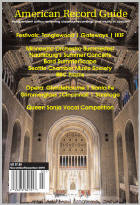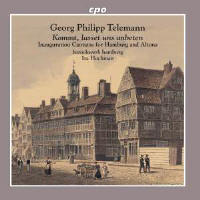Texte paru dans: / Appeared in: |
|
|
Outil de traduction ~ (Très approximatif) |
|
|
Reviewer: John
W. Barker Two more bundles of Telemann’s almost innumerable cantatas, one bunch secular and civic, the other sacred and ecclesiastical. There are some overlaps in character, and they both draw on that wonderful Lutheran heritage of chorales. Both employ as framing or defining components the setting of Psalm verses (in German). Such settings are labelled as dictum or spruch, indicating a received authoritative text.
Our first program is part of a series of recordings for CPO undertaken by Hochman of works written by various composers wrote for civic occasions in Hamburg and in nearby Altona. Two such items by Telemann have already appeared (555 018: M/A 2018). In the present release, Hochman gives us three. The first, Kommt, lasset uns anbeten, is an “Inaugurations-Music” for the chapel in St Jacob’s Hospital in Hamburg, nearly 40 minutes long but for modest instrumental means and four singers (who join as the choir). Then there is another inaugurations-music, Geschlagene Pauken, auf!, slightly over half that length but more grandly scored. It was composed for the opening of an “academic gymnasium” or high school in Altona. Finally, there is a four-minute choral motet (4 singers, 2 violins, and continuo) that sets a Latin text from Ecclesiastes that celebrates student life, written for the opening of examination time at the Hamburg high schools. The otherwise German texts are quite fulsome and forgettable, but the music is rollicky good fun, and Hochman leads her period-style forces through it with relish. (I had to think about it: in our time and our country, how many cities would commission one of the most famous composers of the day, one already under its employ, to write music for their high-school festivities? Much less for their exams?)
Our second release taps into the large body of cantatas that Telemann composed for the Sundays and feasts of the Lutheran liturgical year. He cast these in the form of the oratorio, which was understood in German music at the time as a work using a contemporary text, with either Scriptural or allegorical characters. All but the last of the four presented here have allegorical ones—Freude (Joy), Andacht (Prayer), Hoffnung (Hope), Liebe (Love), Vorsicht (Prudence), Ehrfurcht (Reverence), Glaube (Faith), Treue (Fidelity); Erkentnis (Knowledge), Vernunft (Reason), Dankbarkeit (Gratitude); Erwägung (Contemplation), Heiliges Verlangen (Holy Longing), Vertrauen (Trust)—who have formulaic exchanges with each other, joining together in recitatives and dictum sections. The first three of these four are from “oratorios” composed in the early 1730s. The last is a work of 1744, when Telemann published such cycles. In all four, the theological elements interest us less than the musical and quasi-dramatic ones. As always, Telemann’s tunes are constant delights, and his clever highlighting of word meanings is absorbing. Once more, we are given not monumental masterpieces but a lot of cheerful and inventive listening. Willens’s performers are consistently stylish, and Mauch and Mertens are familiar names. The recording sound is particularly clear and vivid. The booklet includes extensive notes, texts and translations; though I do wish more effort had been made to identify which singer appears where.
| |
|
|
|
|
Cliquez l'un ou l'autre
bouton pour découvrir bien d'autres critiques de CD |
|




